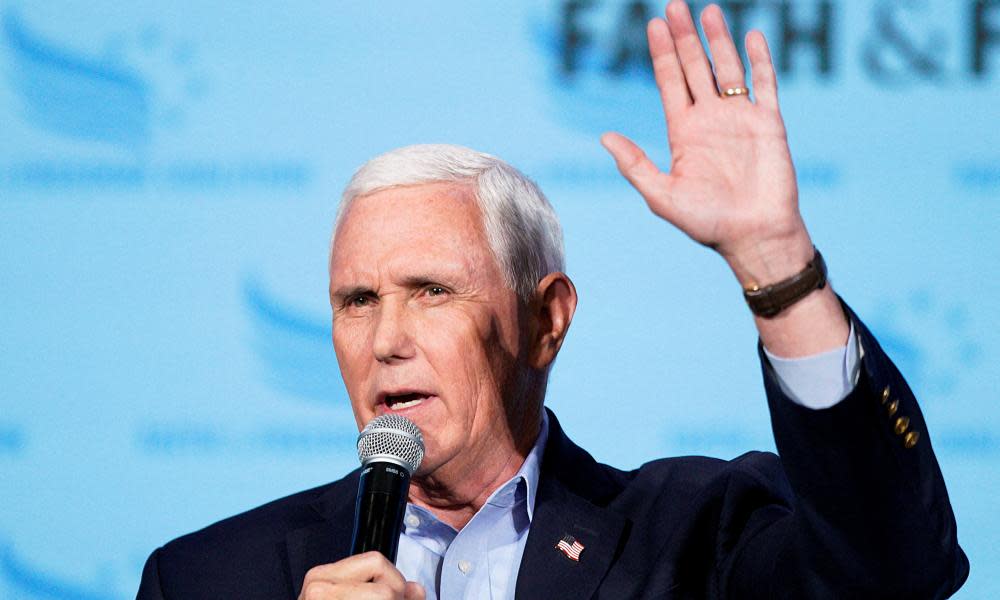Pence’s historic challenge: can Trump’s loyal deputy become his nemesis?

Mike Pence enters the 2024 presidential race with a murky path to capturing the Republican nomination and a contentious relationship with his former boss and now primary opponent, Donald Trump.
Pence formally launched his campaign on Wednesday with a video announcement, after the former vice-president spent months traveling to early voting states and speaking at Republican party events. Pence is scheduled to hold his first official campaign event in Des Moines, Iowa, on Wednesday afternoon.
“We can turn this country around. But different times call for different leadership,” Pence says in the video. “Today, our party and our country need a leader that will appeal, as Lincoln said, to the better angels of our nature.”
Pence’s campaign launch kicks off a historic primary battle, as this marks the first time in more than 80 years that a former vice-president has competed against his former boss in a nomination fight.
Related: Mike Pence, Trump’s former vice-president, announces White House run
The former vice-president becomes the latest Republican to join a growing field of candidates looking to deprive Trump of the nomination. Governor Ron DeSantis of Florida, the South Carolina senator Tim Scott and the former New Jersey governor Chris Christie have all jumped into the race in just the past few weeks, following the campaign announcements of Trump, the former South Carolina governor Nikki Haley, the former Arkansas governor Asa Hutchinson and the entrepreneur Vivek Ramaswamy.
Historically, vice-presidents have been able to use their past White House experience to make a strong case for their party’s nomination. But Pence faces unique challenges that could complicate his already difficult task of attempting to topple Trump, who continues to lead in polls of Republican primary voters.
Pence left the vice-presidency in 2021, weeks after the January 6 attack on the US Capitol. As part of his efforts to overturn the results of the 2020 presidential election, Trump attempted to pressure Pence into using his role as president of the Senate to disrupt the congressional certification of Joe Biden’s victory.
Pence refused to do so, as he argued that the vice-president has no authority to object to the election results, an assessment supported by constitutional experts. Trump lashed out against Pence, accusing the vice-president of cowardice for refusing to meddle in a free and fair election. The vice-president then became a target for the insurrectionists who attacked the Capitol, some of whom chanted, “Hang Mike Pence!”
Secret Service officers safely evacuated Pence for the Capitol, and he was ultimately able to oversee the certification of the election results. But the horror of that day has become an ongoing source of tension between Pence and Trump, who has continued to falsely claim that his vice-president could have stepped in to overturn the election results. When asked at a CNN town hall last month whether he owed Pence an apology for endangering him on January 6, Trump said no.
Although Pence’s actions on January 6 have been lauded by Republicans and Democrats in Congress, they have not made him as popular with the primary voters whose support he will need to win the nomination.
According to a Quinnipiac University poll taken last month, 48% of Republican voters have a favorable opinion of Pence, compared with 35% who have an unfavorable opinion of him. Pence’s favorability rating of +13 among Republican voters is considerably lower than Trump’s rating of +75 and DeSantis’s of +74.
Pence appears to be counting on white evangelical voters, who make up a significant portion of the Republican base, to boost his standing. To appeal to those voters, Pence has leaned heavily into the issue of abortion access.
Since the supreme court’s reversal of Roe v Wade last year, abortion rights have become an even more crucial issue in America’s elections. Other Republican presidential candidates have struggled to clarify their stances on a potential federal abortion ban. Pence has said that he would “of course” support a six-week nationwide ban.
“I’m pro-life. I don’t apologize for it,” Pence told CNN in March. “I believe that we’ve got to do everything in our power to restore the sanctity of life to the center of American law. And I’d support federal legislation in that regard if I was in the Congress or had any other job here in town.”
Despite his staunch support for a federal abortion ban, it remains unclear whether Pence can sway a large number of evangelical voters, many of whom remain loyal to Trump after helping him secure his 2016 win. A Monmouth University survey released in February found that 3% of evangelical voters wanted Pence to be the Republican presidential nominee, compared with 34% who said the same of Trump.
Pence has his work cut out for him, but he has projected optimism as he prepares to enter what promises to be a bruising primary fight.
“I’m very confident that we’ll have the support to be able to carry our message, tell our story,” Pence told Fox News on Saturday. “My hope is, should we enter the race, that by the time people are making decisions, we won’t just be well known, we’ll be known well. They’ll know who the Pences are. They’ll know what our values are, our sense of calling, and I’m confident we can do that.”

 Yahoo News
Yahoo News 
